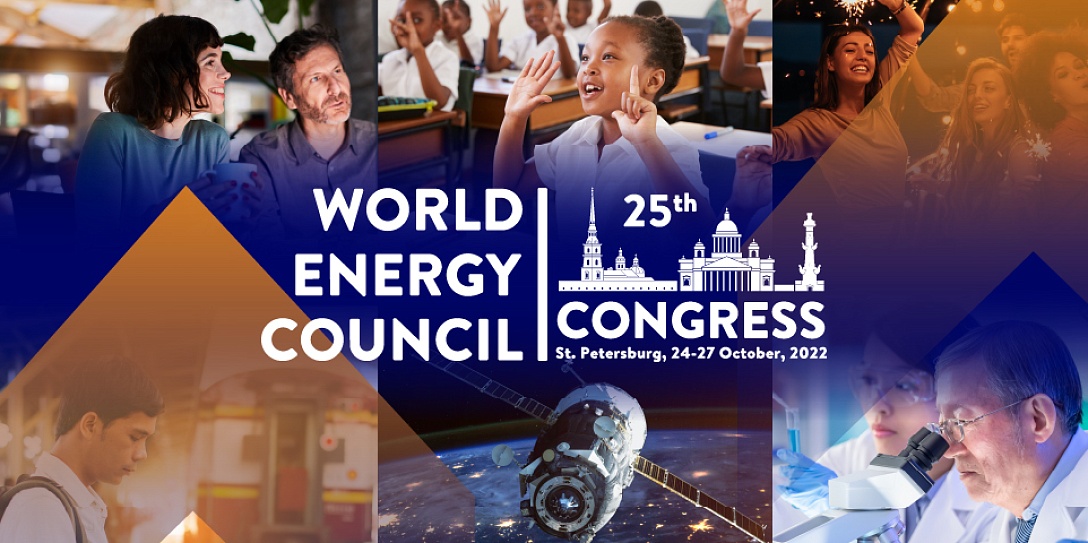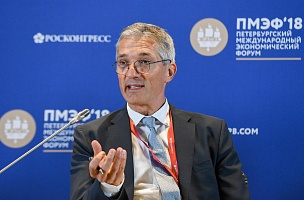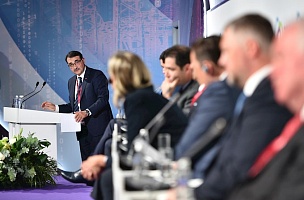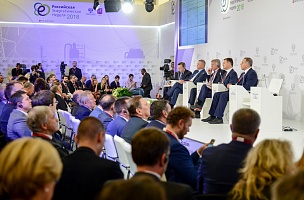Congress topic themes released today by Deputy Prime Minister Alexander Novak and Secretary General & CEO Dr Angela Wilkinson one year ahead of event
Energy security, sustainability and affordability at forefront of new energy crisis debate
St Petersburg (27 October 2021): The 2022 St Petersburg World Energy Congress, themed Energy for Humanity, will place people at the heart of the global energy transition agenda.
Energy for Humanity is front and centre of the World Energy Congress programme, recognising that energy transitions start with people and their needs. Energy transitions have always triggered societal disruption and current transitions are no exception.
The four-day triennial event, running between the 24th and 27th October 2022, will explore the role of connected energy societies in driving forward global energy transition in a less predictable and faster shifting context and ensuring no region or community is stranded or left behind in the process.
Today, one year ahead of the event itself, Russia’s Deputy Prime Minister Alexander Novak and the World Energy Council’s Secretary General and CEO Dr Angela Wilkinson, release questions and themes to be addressed at World Energy Congress 2022.
Since the first Congress in 1924, the World Energy Congress has led the global energy agenda and operated as a truly unique community through different eras of energy transition. The Congress is attended by heads of state, ministers, and CEOs, and wider energy society interests, including energy customers and users, cities and communities.
Dr Angela Wilkinson, Secretary General and CEO of the World Energy Council said:
«Society’s relationship with energy is changing. This has profound implications on the way people live their lives across the world, their quality of life and the local and global impacts of their energy use. In St Petersburg, we will be celebrating the role of people in driving change, and sharing new human-centric stories of creativity and collaboration. We aim to demonstrate why humanising energy is the best way to ensure diverse and connected energy societies flourish together through energy transition and transformation.
«Deputy Prime Minister Novak and I are delighted to outline today those critical questions and topics of focus for next year’s Congress. These place people at the heart of the transition agenda and include how the next normal could impact energy developments across different regions, what tipping points could accelerate or derail transition and what new policy approaches and market designs are required for a more customer-centric, resilient and climate neutral energy future. New financing and investment models will also feature strongly in the programme and we will address the thorny, societal impacts of whole system change.»
Alexander Novak, Deputy Prime Minister of Russian Federation and Chair of the Organising Committee of the World Energy Congress, commented:
«The Russian Federation has proudly accepted the honorary baton of the 25th World Energy Congress — the largest and most influential event in the energy sector. The Congress in St. Petersburg will bring together heads of state, government officials, CEOs of major energy companies as well as members of the expert community to address significant issues of modern energy. The discussion topics reflect a broad range of issues facing our entire industry. I am confident that through joint efforts we will be able to build an open and constructive dialogue in St Petersburg aimed at providing safe, reliable, affordable and sustainable energy to the entire world population.»
Dr Angela Wilkinson added: «The St Petersburg World Energy Congress marks the start of the World Energy Council’s centennial year. We will be celebrating our 100th birthday as the world’s most globally inclusive and diverse energy community.»
The year-long countdown to the 25th World Energy Congress commenced today with security of energy supplies as well as affordability and sustainability very much at the forefront of political and media agendas.
The themes for next year’s Congress are centred around the key challenges facing energy users and producers and the impact of energy transitions on societies across the world. These include asking how the new, post-pandemic, ‘normal’ will shape the energy transition, where leadership will emerge and how we can learn from the lessons of the past to better plan for the future.
The Congress will also consider how perceived «tipping points» and the risks associated with the green transition may accelerate or derail progress. The eruption of new energy crises across the globe have brought energy security, and affordability, to the forefront and the conference will discuss the need for more diverse and connected energy supplies to better prepare for future disruptions. The impact of gamechangers including artificial intelligence (AI) and quantum computing, carbon removal, clean and synthetic fuels, flexible storage solutions (batteries, hydrogen etc.) and smart integrated grids will also be examined.
The key themes selected for the 25th Congress cover seven questions arising from the major global questions facing the sector:
1. How will the ‘next’ normal impact global energy transition?
2. Why is humanising energy an imperative in this decade of delivery?
3. How might tipping points and the risks of transition crises accelerate or derail progress to 2030 or beyond?
4. Preparing for the customer-centric energy future — what are the implications for market and policy design?
5. How are new leadership mindsets and models impacting energy developments?
6. How do regional realities differ and what can we learn from this?
7. What new models of financing and investment in energy are emerging?
Further information about the Congress, discussion topics and registration can be found on the Congress website.






